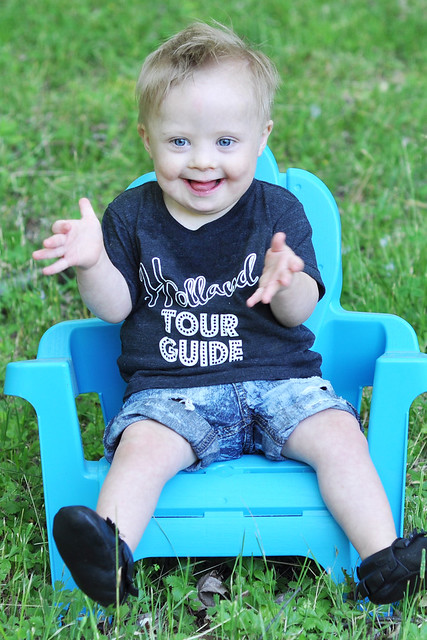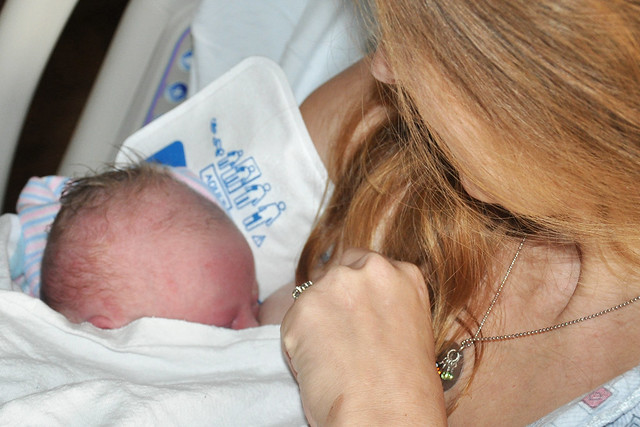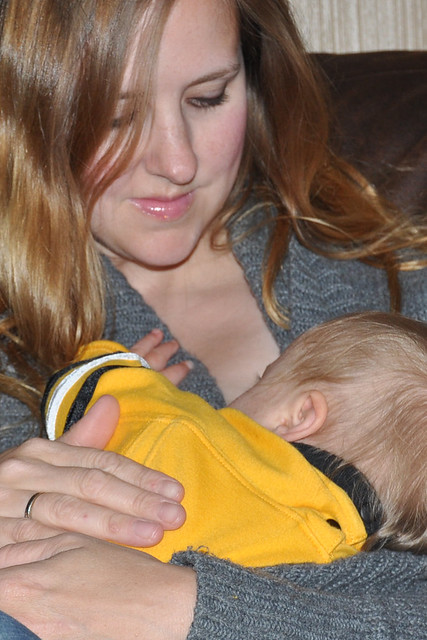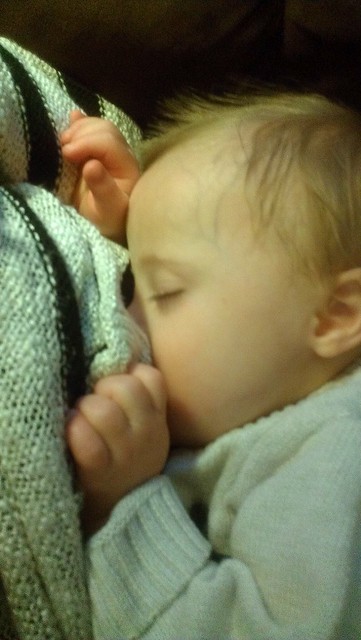When I found out baby #4 was on the way, I didn't even think about whether I would breastfeed or not. I knew I would.
Before I'm labeled as a judgmental breastfeeding mom, let me assure you that I've experienced both worlds.
Dylan was 100% formula fed, and I have no regrets. He's very smart and he has a top-notch immune system. He may have quite a few ER visits under his belt for injuries (he is a boy, after all), but formula didn't harm him in any way!
Lexie and Lily were exclusively breastfed. I just wanted to try, and it ended up working well for us! I nursed Lexie for 11 months, and I nursed Lily for 14 months. They both weaned when they were ready to be done.
After nourishing 3 children, I knew what choice was right for our fourth child. Breastfeeding was convenient and free, so it was the clear winner!
I expected to hold my 4th baby right after he/she was born, and to immediately start breastfeeding. What I didn't expect was to have my baby taken away from me, and to be told that there was a very good chance that my baby had Down syndrome. That I already knew. I knew it the moment his eyes met mine.
Breastfeeding Liam for the first time was nothing like I imagined it would be.
My memories of that day are foggy. I remember all the feelings, but I
can't remember the timeline. At some point, Liam was back in my arms,
and in that fog, it registered that I had to feed him. I lifted him to
my breast, and tried to get him to latch on. I remember staring down at
him and watching my tears drip onto the top of his head. He was so foreign to me, and didn't feel like my baby. I just wanted to wake up from the nightmare I was living.
After a few minutes, it was evident that breastfeeding Liam was not going to be the easy experience I anticipated. He was so sleepy and his latch was so weak. The lactation consultant came in, smiled, said it was obvious I knew what I was doing, and walked back out. I wanted to run after her screaming, "NO! I don't know what I'm doing! I have NO idea how to feed a child who has Down Syndrome!"
I fell in love with Liam in the wee hours of the morning. As I stared
into his eyes, the fog and the grief lifted. I vowed to love him and
protect him, and give him the best life I possibly could. Once again, I
lifted him to my breast and I just kept trying to get him to latch on
and stay latched on. We did it over and over and over again until it was time to
leave the hospital. I was determined to make it work.
When another lactation consultant stopped by before we left, I asked so many questions about breastfeeding a baby who has Down Syndrome, and my questions were brushed off. I'm not quite sure if she just didn't know how to answer, or if she, along with many others, were unsure as to whether he had Down syndrome or not. Either way, I knew I was on my own.
Four weeks later, the lab results were finally in. Liam did have Down syndrome. At that point, I expected the news.
The first month of breastfeeding was a big struggle. Although I really did know what I was doing, Liam was extremely sleepy, and waking him to eat was nearly impossible at times. His weight began to plummet. Newborns are supposed to sleep a lot, but he truly slept 22 hours a day. I later found out that this was a VERY common issue in newborns who had Down syndrome.
When Liam was a few days old, we went to
the doctor for a weight check. He was still under his birth weight. We
returned a few days later, and he still hadn't gained any weight. Liam's pediatrician did not want me to give up breastfeeding, but she recommended we return to the lactation consultant to get a supplemental feeding device. The lactation consultant made
sure he was nursing properly (he was) and showed me how to use the
device.
When Liam was 5 weeks old, he finally woke up. He stayed awake for longer periods of time, he wanted to eat often, and breastfeeding clicked.
However, at 2 months old, Liam was still under his birth weight of 7 lbs 11oz. He was
nursing very well by that point, but not gaining any weight. He had his first
appointment at the Down Syndrome Clinic, and even thought he looked
great, the doctor was concerned enough about his weight to hospitalize
him for some tests.
We had our first encounter with the feeding team during our 3 day stay. Every single member of the feeding team informed me that a baby who had Down Syndrome could not breastfeed effectively. They watched him breastfeed, and tried to come up with reasons as to why he wasn't doing it properly, but failed.
When that didn't work, they insisted he must be aspirating, and told me I
would have to quit breastfeeding if he was. They began to force a bottle into his mouth, and it truly was the most unnatural thing to watch. Moments before, he was serenely breastfeeding. Then, they ripped him off the breast, shoved a bottle in his mouth, and continued to force it into his mouth as he screamed, kicked, and flailed. They shrugged, said we'd see what the test results showed and insisted I bottle feed him. As soon as they walked out the door, I
started to cry. I knew I would do what was best for my child, but
after a lot of research, I felt like breast milk was the best option.
At that moment, Liam's wonderful pediatrician called. She reassured me that I should not give up on breastmilk, even if he was aspirating. She said the feeding team would insist that breastmilk could not be thickened properly in a bottle, but it was possible. I hung up the phone and breathed a sigh of relief.
After many tests, some of which were very invasive and involved him
being put under general anesthesia, they were unable to find a cause for
his low weight. With the exception of discovering mild reflux and
mild Laryngomalacia (floppy vocal chords/airway), everything checked out
perfectly. We were sent home with medication for the reflux and we were
told to ditch the supplemental feeding device, continue to breastfeed, and start supplementing with bottles of high calorie formula.
I wanted Liam to start gaining weight because he was so tiny, but he had a very difficult time drinking from a bottle. It took him over
an hour to drink 2 ounces once he settled down enough to drink. Within a week of leaving the hospital, Liam
started Occupational Therapy. His amazing therapist (who is still with us!) got him to drink properly
from a bottle 5 minutes after she arrived! Liam continued to breastfeed
the majority of the time, but we supplemented with 1-2 bottles of high
calorie formula a day.
Despite the supplemented bottles of high calorie formula, weekly weight checks with his pediatrician, and weekly OT sessions, Liam's weight still stayed low. He reached his birth weight just after he turned 2 months old. At that point, he began to gain, but the gain was very slow, and often dipped or plateaued.
I began to question if all these extra feeding methods were unnecessary. His heart was completely fine, and I was repeatedly told that babies who had Down syndrome used so many more calories than a "typical" child did just to do simple things. Liam began rolling early, and lifting his head up early, so it made sense that he was using a lot of calories. Plus, many kids with Down syndrome had the same issue as he did. Fighting the bottle was most likely wasting a LOT of calories.
Just before 4 months old, Liam began to flat out refuse his supplemental bottle. His OT and pediatrician agreed that he was expending more calories fighting off the bottle than he was actually taking in. When he breastfed, he was calm and thorough. We were given the go ahead to stop all bottles of high calorie formula, and to exclusively breastfeed. We stopped fighting with him to force calories into his body, and just let him be. He KNEW how to breastfeed.
Shortly after turning 4 months old, Liam began watching other people eat and reaching for utensils. After a month passed, and his interest remained, Liam's OT and pediatrician recommended starting solids. Armed with a list of high calorie foods, we started with one solid feeding a day. After hearing many horror stories about feeding babies who had Down syndrome solids, we expected the worst. Liam, however, did better than my "typical" babies!
Shortly after turning 4 months old, Liam began watching other people eat and reaching for utensils. After a month passed, and his interest remained, Liam's OT and pediatrician recommended starting solids. Armed with a list of high calorie foods, we started with one solid feeding a day. After hearing many horror stories about feeding babies who had Down syndrome solids, we expected the worst. Liam, however, did better than my "typical" babies!
It was at that point that Liam finally began to gain! His pediatrician and OT always felt that Liam's slow gain was due to him burning off almost as many calories as he consumed. Breastfeeding became easy for him, but he had to work harder to take the bottle. When we made the switch to exclusively breastfeeding and giving him one solid meal a day, he gained an entire pound in a month. That was more gain than ever before!
We were thrilled with his progress, and we were confident that this was the best feeding method for him!
At 6 months old, Liam returned to the Down Syndrome Clinic. He had FINALLY
reached 10 lbs. The pediatrician and OT were thrilled with his weight
gain, but his stats weren't even on the growth chart. Liam's
doctor at the Down Syndrome Clinic recommended a visit with the feeding
team again. We were not looking forward to meeting with the feeding
team, but we loved his doctor, and knew he didn't want to miss something that could be causing the slow gain. So off we went.
Prior to the appointment, Liam's OT told us everything the feeding team
was going to say. She worked on the team prior to switching to in-home
therapy. She explained that they were very anti-breastfeeding. She explained how they would say babies with Down Syndrome couldn't breastfeed, and they
would insist that we switch to formula feeding.
The appointment was worse than we ever imagined. A pediatrician, speech
therapist, occupational therapist, and nutritionist were in the room
with us. They spent the entire hour talking over each other and talking
over us. They didn't even look at Liam as an individual. They treated
him like he had every possible characteristic of Down Syndrome. They
watched me breastfeed him for 30 seconds, then told me that
breastfeeding was not an effective feeding method for children with Down
Syndrome. They refused to watch him eat solids and said he simply couldn't do it. The nutritionist was the only one who tried to help us with
our current feeding plan, but she was flat out told that it wasn't an
appropriate solution. They told me to stop solids, stop breastfeeding,
and just give him bottles of thickened formula until he was 1.
By that point, my head was pounding. I explained that he was not
aspirating liquids, and I inquired about how we were supposed to just
feed him bottles of thickened formula when HE WOULDN'T TAKE A BOTTLE.
They replied that he was just going to have to learn. The speech
therapist came over at that point, made the thickened bottle, and
repeatedly tried to shove it in his mouth. Poor Liam was sputtering,
gagging, and crying, and I couldn't help but wonder how this harsh
method was better than the relaxing, easy way he breastfed.
I was furious and my husband was ready to flip out. I just
nodded my consent so we could leave as quickly as possible. As we
walked down the hallway, he asked me if I was really going to take those
fools seriously. I looked at him, smiled, and said, "Absolutely not.
I'm not changing anything."
I didn't change a single thing.
I was producing enough milk and Liam was breastfeeding effectively. Liam continued to breastfeed and eat one solid meal a day. He went to weekly weight checks and had weekly sessions with his OT. A nutritionist came to our house once a month to weigh him and make suggestions on what high calorie foods he should eat. All three medical professionals were pro-breastfeeding and they were Liam's biggest supporters. He gained a pound each month. I knew we were doing the right thing.
At 9 months old, his nutritionist said she was thrilled with the way he
was eating and gaining. He was released from her care. At that point,
his pediatrician said he didn't have to come in for weight checks
anymore. His issues with reflux and laryngomalacia were even resolving on their own! After 9 months of weekly weight checks, we were elated!
At his 1 year appointment at the Down Syndrome Clinic, Liam's doctor was
very happy with his weight gain. Liam was finally on the Down syndrome chart. Very
low on the chart, but finally following his own curve! He asked if the
appointment with the feeding team helped, and I told him the truth:
that following my gut, cutting out all the unnecessary intervention, and
just letting him breastfeed was what helped. I knew he was doing it
right and I knew fighting with him to take a bottle was doing more harm
than good. Once we relaxed and just let him be, he started to gain!
Liam was still breastfeeding at age 1, he was eating 3 solid meals a day, and thanks to his Occupational Therapist's guidance, he was already beginning to self feed. At his 1 year well exam, his pediatrician suggested that I continue to breastfeed him through the winter. I always assumed I would start weaning at 12 months, just like I did with Lily, and be done by 15 months. I never really thought about extended breastfeeding, but Liam was still a very tiny 15 pounds, and I didn't think it could hurt. I took her advice without a second thought.
Liam is now 21 months old. He is still very small. At his last visit with the pediatrician, she told us that he's now the size of a typical 9-12 month old boy. I feel like we wasted so much time searching for a problem that didn't exist, instead of just letting him do what came naturally. He's small. He's meant to be small. Many other children with Down Syndrome are small. I say he's just tiny but mighty!
Liam did continue to breastfeed through the winter. As winter ended, I decided to let him wean on his own. He cut back to just a short morning and evening nursing session, which eventually progressed into just a short evening nursing session. At 21 months, Liam still nurses a few evenings a week for just a few minutes. He's rapidly losing interest and I know very soon his breastfeeding days will just be a distant memory.
Thanks to previous breastfeeding experience, following my gut instinct, and trusting the medical professionals who believed in Liam, we were able to achieve something HUGE.
They said he couldn't do it. I said he could.
They said he couldn't do it. I said he could.
Liam is an incredible eater, and has always been ahead of the Down Syndrome curve when it came to feeding milestones. He's gaining consistently, and although he hasn't even made it onto a typical growth chart, he's maintaining his own curve. He's happy, he's meeting all his milestones, he's healthy, and he's THRIVING.
I wish I could face the feeding team just one more time. I would tell them that they were wrong. I would remind them to look at a child with Down Syndrome as an individual instead of just labeling them with every possible characteristic. I would show them my happy, healthy boy with the most contagious smile and tell them that breastfeeding was ABSOLUTELY the right choice for him.
I'm glad I didn't listen to the people who didn't know my boy. I'm glad I listened to the people who did. And I'm proud of myself for trusting my gut and giving him the gift of 21 months of breast milk!
This was just my story to tell. Everyone has their own story and a different set of experiences. No story is right or wrong.
Although there are many babies with Down Syndrome who do have feeding issues, there are those who can and do breastfeed effectively. Sadly, many medical professionals tend to push formula feeding, because it's just easier. My hope is that this post will help another mother who finds herself in a similar position.
It IS more difficult to breastfeed a child with Down Syndrome. They tend
to be harder to wake at the beginning and their suck is a lot weaker
due to low muscle tone. With determination, support, and lots of
practice, it is very possible to succeed. I know there are obstacles to
overcome, but it can work. When safety is an issue, such as aspiration, formula is
absolutely the right choice.
No matter what feeding choice you make, with love and proper nutrition, your child will thrive!
{This post was inspired by a guest post I shared on The Breastfeeding Diaries. We've come a long way since Liam was 13 months, and I never expected he could go this long! I'm so glad he did!}






Good for you, mama. The best takeaway (that I find pertinent with any child, special needs or no) is that you have to look at the individual child and not the diagnosis.
ReplyDeleteI've seen that a lot with Alex and his needs, and I'm glad you went with your gut!
I completely agree! Thank you!
DeleteStef, I would either write a letter to the feeding team or send them a copy of this blog post. Professionals tend to stay completely clinical and, like you said, do not look at the child as an individual. We encountered the same thing with Eli when they were wanting to diagnose him with autism. We, too, had a great therapist who advised us against ever receiving an official diagnosis for him but to, instead, just treat the problems we knew he had. We have had to fight professionals his entire 12 years against getting a diagnosis for him. In fact, that was the deciding factor in taking him out of school to homeschool. They would not keep him on an IEP without a medical diagnosis. So dumb. Anyway, good for you in standing up for the rights and well-being of your sweet boy.
ReplyDeleteThat's a great idea. Thank you!
DeleteI'm sorry you had to deal with all that! It sounds like you made the right decision.
A mother knows best!!! Sometimes it is hard to stand up against doctors who are the "experts" I'm glad you were able to and I'm glad you had some that understood what you wanted for your baby and backed you!
ReplyDeleteAs a mom, trusting your gut is EVERYTHING. I am a mom of 2 boys (2 & 3 years old) and dealing with my oldest has always been a struggle. His speech is delayed & sleep has always been an issue, but other than that he's a perfectly healthy boy who is loving, funny & smart.
ReplyDeleteNeither one of my boys has down syndrome, but I can completely relate to you in the sense that only YOU know what's best for your child. I can't tell you how many times my oldest has been looked at funny, disrespected by adults & treated as a number. People should look at children as that & not as a problem that needs a diagnosis...
Great job, mom. You got this! ♥
Thank you so much, Elizabeth!
DeleteOMG, this makes me tear up. Seriously. Why WOULDN'T you breastfeed if you wanted to? Having a disability doesn't make a bit of difference in that. It just doesn't make any sense! Go you for following your instinct and standing up for Liam. He is so lucky to have you as his mama!
ReplyDeleteThat's how I feel, too! Thank you!
DeleteSo proud of you for being an advocate for your son. I firmly believe that a mothers instinct should usually be trusted, you knew what Liam was capable of and believed in him when others didn't. He is lucky to have such a loving mother, I know breastfeeding can be hard work and you've clearly done a wonderful job of it. Such an inspiring story!
ReplyDeleteThank you so much!
DeleteI love the way that you advocated for Liam. I can't imagine the struggle that must have been and the worry that accompanied it. But, you knew what was best. I am so happy that breast feeding Liam worked out so well.
ReplyDeleteThank you!
DeleteI absolutely love this and that you were so strong in knowing what was best and didn't give up. Good for you mama. Such an inspiration.
ReplyDeleteThank you!
DeleteThat's great that you stood up for your son and for your right to breastfeed him. I'm sure he'll only continue to benefit from the fact that you did it.
ReplyDeleteThank you, Crystal!
DeleteHe sounds like an awesome little guy and GOOD FOR YOU for sticking with what you knew was right. Your son (and other kids!) are so fortunate to have a mom like you! <3
ReplyDeleteThank you so much!
DeleteThis is such an amazingly beautiful, inspiring, well written story. Liam is so perfect, and you are the perfect mom for him, I think this is an amazing tale all around and will be sharing with my breastfeeding group!
ReplyDeleteThank you so much, Bethany!
DeleteMama knows best! Good for you for making the choice, I'm sure little man appreciates you! :)
ReplyDeleteThank you!
DeleteI'm glad you went with your instinct. There are so many wonderful doctors out there, who are knowledgeable and kind, but then there are the types that push you into doing something you feel is wrong for your child. I'm empowered by your attitude. Thanks for sharing!
ReplyDeleteThank you! Luckily, we've had our fair share of amazing doctors, too!
DeleteI loved breast feeding Lewie, but I had an awful experience with my doctors too--especially the lactation consultant who force fed my baby a bottle too because she said he lost too much weight. (Seriously, my son was born at 7 lbs 6 ounces, and he only lost a few ounces...) This woman was far from nurturing. I think her goal was to make women who had a hard time breast feeding feel inferior. Anyways, GOOD FOR YOU! You knew what was right for you and Liam, and you did it!! He's such a healthy and happy boy too :)
ReplyDeleteA lactation consultant did that?!? Wow! A few ounces is not that big of a deal!
DeleteThank you for your kind words!
Good on you for doing what you knew was right for your child. Doctors need to start seeing patients as individual people who may not always follow the "normal" path and your Liam is the perfect example of that.
ReplyDeleteThanks for linking up with us at Best of the Blogosphere :)
Thank you so much for your sweet comment!
Delete